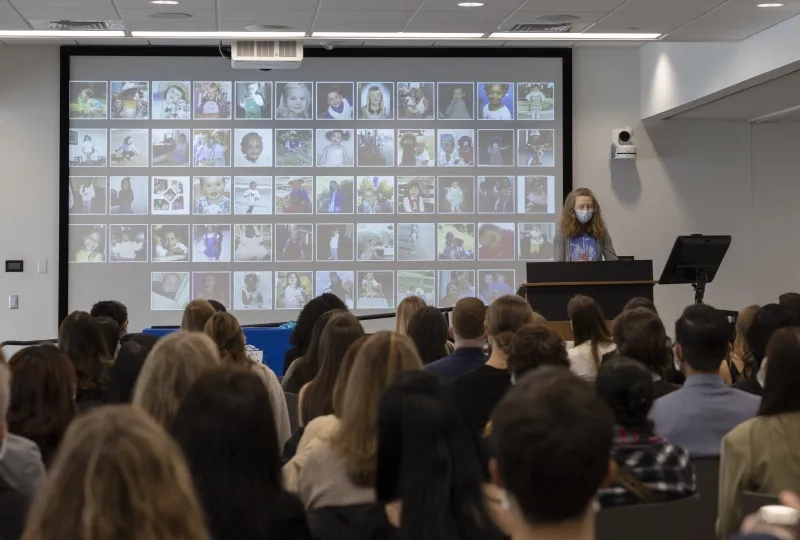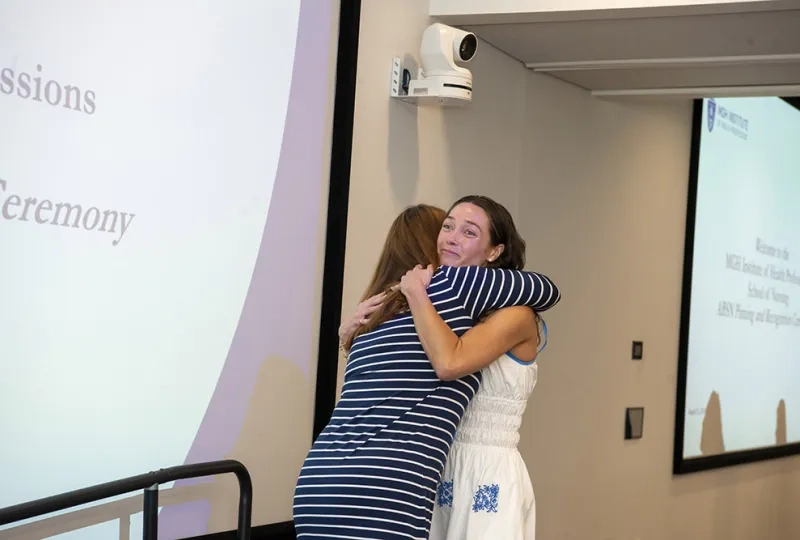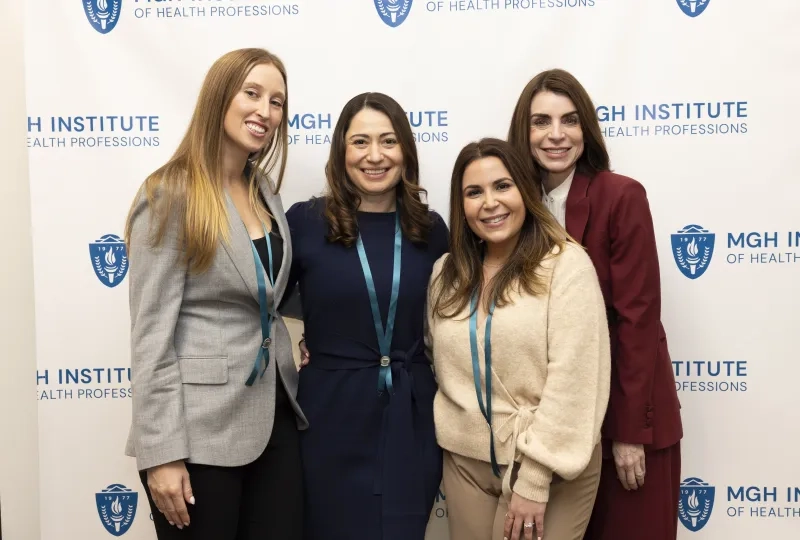
MGH IHP Nursing Faculty Who Are Making Waves in Their Fields

Meet five faculty who are leveraging clinical practice for the benefit of their students
It’s one thing to teach what you know, but it’s another when you can practice what you preach while teaching it. That’s what nursing students receive in most every class offered at the MGH Institute of Health Professions – faculty who keep their skills sharp and stay on top of trends by staying in practice. Palliative care, pediatrics, substance use, psychiatric care, and women’s health are just some of the areas where IHP faculty are making a difference – in their fields and in the classroom.
Meaghan Rudolph
Nursing Instructor
Psychiatric Clinical Nurse Specialist, Researcher at Massachusetts General Hospital

On any given day, Psychiatric Clinical Nurse Specialist (PCNS) Meaghan Rudolph is performing assessments, making diagnoses, and prescribing medications and treatments for patients with acute psychosis, bipolar disorder, significant trauma, or a patient who is simply struggling and unable to do basic life activities.
“It’s a little bit of detective work to figure out what's going on and try to determine a diagnosis and what treatments might help,” said Rudolph, who works at Massachusetts General Hospital. “Really, it’s the gamut of anything.”
Often times, the detective work pays off when Rudolph, a 20+ year veteran, discovers something that might have been overlooked.
“I just had a patient who had all these significant symptoms - she was tired, feeling really frustrated, irritable, and sad, and really struggling to concentrate and focus,” said Rudolph. “It really looked like depression, so her primary care physician (PCP) referred her. But in doing my assessment, and then also looking at some of her medical history and the lab result, it turned out to be a medical issue that looked like something psychiatric.”
Rudolph, who is also a researcher currently examining gun violence, says it’s the day-to-day interaction with patients that makes a difference when teaching nursing students at the MGH Institute.
“Instead of teaching just cold facts about something, folding in clinical cases to demonstrate what you're trying to teach makes it infinitely easier to understand the concepts because there's a real person,” noted Rudolph. “When you're able to tell students that this was somebody I just saw the other day, it helps bring it home and helps paint a more rounded picture. I can say ‘Here's the story of Susie, and here's how she came in, and here's what she felt from her perspective, from the subjective side. Here's what I was seeing from the objective side. And here's why this is a diagnosis of schizophrenia.’ Something like that is invaluable for teaching."
Jason Lucey, MS-NU ’01
Assistant Professor
Nurse Practitioner, Wentworth Douglass Hospital Express Care

When Jason Lucey began his clinical career more than 20 years ago, one thing was obvious.
“The phenomenon of substance use and how it affects health was poorly handled,” recalled Lucey. “I was poorly prepared for it as were most clinicians in their programs. We were just unprepared for how to deal with people who use substances and have negative health outcomes from them.”
Lucey entered nursing when the number of overdose deaths and prescription drug use related overdose deaths was skyrocketing.
“I had lots of interactions with patients who were using opioids,” said Lucey, who graduated from the Institute in 2001 with a Master of Science in Nursing. “Those medicines were negatively impairing their health and I needed to try to figure out a way to not be part of the problem by just prescribing lots of opioids but rather, be part of the solution. How can I help a person who has developed an addiction problem potentially see a better day tomorrow? And I found that without the self-learning and the knowledge about evidence-based approaches like motivational interviewing and having non-judgmental conversations, what you ended up having was a day of conflict, patients being mad at you, you being mad at them. No one wants to have that.”
Lucey served on a regional task force addressing the opioid epidemic in New Hampshire and served as representative of the NH Nurse Practitioner Association on a legislative commission that led to legalization of syringe service programs in NH. He is also a founding member of the NH Harm Reduction Coalition which promotes compassionate care for people who use drugs through evidence-based harm reduction. The policy work and coalition work has helped Lucey with patients and what he brings to the classroom.
“My experience in the policy world and with recovery and seeing how people can actually benefit from all these interventions is a way of sharing hope and optimism,” he said. “Substance use is a treatable condition, and the prognosis is pretty good if we if we keep people alive.”
Jennifer Durning
Instructor
Pediatric Nurse Practitioner, Mass General Brigham Community Physicians

No matter the clinical situation, Jennifer Durning teaches her students to always find the joy factor.
“There's something fun in almost every interaction,” said Durning, a pediatric nurse practitioner for 24 years. “Even with a child who's fearful or crying because they're worried about getting shots, there's usually some way to make a connection over something a little bit goofy, a little bit fun, and perhaps ease their minds a little bit.”
Durning practices what she preaches at Mass General Brigham Community Physicians, where she’s a pediatric nurse practitioner.
“Another thing my students hear me say a lot is that every patient encounter is a little bit of a pediatric-themed improv experience,” she said. “With children, you never know what's going to work from one day to the next or one age group to the next.”
What does work is relaying patient experiences to the classroom, an educational aspect she didn’t always see during her school days.
“I had this one professor who hadn’t touched a patient in more than a decade, so whenever we asked as question, her answer was, ‘I can tell you we used to do it,’ and that felt so silly. When we’re a very practice-focused discipline, we need to be able to say, ‘We have active practices.’ I think that's part of what makes the IHP a good place - most faculty are actively practicing as well as teaching.
“I like to say, ‘Just last week we were talking about this, and then the next day in clinic, I saw this child. Here's how it actually unfolded compared to what we read in the article or in the textbook.’ I think that that real world piece – having that connection to real life – is a huge part of my success in the classroom.”
“I do like to say, ‘Just last week we were talking about this, and then the next day in clinic, I saw this child. Here's how it actually unfolded compared to what we read in the article or in the textbook.’ And I think that that real world piece and having that real connection to real life, is a huge part of my success in the classroom.”
Serena Rosa, DNP ’21, MS-NU ’18
Assistant Professor
Founder, The Postpartum Doctor

Giving birth can be a blissful time with new life coming into the world, but it’s not always that way. That’s where Serena Rosa comes in. Her specialty: what happens with the mother after giving birth.
“I think birth in itself is a beautiful, beautiful thing, but even if the birth goes exactly as planned, on a biological level, the body endures trauma. After labor and delivery happens, the body shakes uncontrollably, and that's a way of the body releasing some of the trauma that labor and delivery endured,” said Rosa. “It's a perfectly healthy mechanism, but that's to say there’s a lot that the body goes through.”
Rosa stays sharp with trends in postpartum care through The Postpartum Doctor, the business she started a few years ago after seeing a trend in what new mothers needed.
“These women were ready to talk about, ‘Who am I now as a mom?’ ‘I don't recognize my body anymore,’ ‘My intimacy is suffering, and I don't know how to balance life’ and all these deeper questions, and it really propelled me to learn. We now have clients all over the nation - even in Europe. And it's been such a joy to build this business.”
The postpartum issues Rosa counsels in the business are translated in what students take away.
“My students are learning things that many other nursing schools don’t teach,” said Rosa, who earned two degrees from the IHP – a Doctor of Nursing Practice in 2021 and a Master of Science in Nursing in 2018. “They are learning how to support their patients during matrescence, a period marked by some of the most significant physical and neurological changes a person can experience in their lifetime, second only to the changes from birth to age one. Their training covers supporting patients who have experienced birth trauma, as well as managing perinatal mood disorders through both holistic and medical approaches—a critical area of knowledge that many clinicians typically lack.”
Sarah Rossmassler, DNP’18, MS-NU ’01
Assistant Professor
Palliative Care Nurse Practitioner, Baystate Medical Center

When Sarah Rossmassler walks the floors of the Baystate Medical Center, she typically wears two hats.
“I’m an advanced practice nurse,” said Rossmassler, a nurse practitioner since 2001 when she earned her master’s in nursing at the IHP. “I'm also an educator, because not only do I teach in the classroom, but I teach on the floors. I teach my physician colleagues, residents, fellows, and advanced practice providers.”
Passionate about palliative care, Rossmassler also teaches her patients that they hold the power to make truly informed decisions that aligns with what is most important to them.
“In the healthcare system, patients aren’t always aware that treatment decisions are best made within the context of their priorities, which may or may not be what is delineated in our clinical algorithms. The aim is to empower patients with an understanding of what is possible, what treatment decisions may mean for them, and then to come to a shared decision about the best course for them,” noted Rossmassler. “When I empower the patient, I'll ask them questions that strive to uncover their values, hopes, and worries. And with that really essential information we can make a decision together that's going to be clinically optimal and also reflective of their singular individual and cultural family preferences.”
Approaches to those tough conversations and seasoned clinical expertise are just some of what the 2018 MGH Institute Doctor of Nursing Practice graduate injects into her classroom.
“As we're learning something as foundational as advanced pathophysiology, we need to think about not only what the pathologic processes are, but what's going to happen as a disease advances,” said Rossmassler. “I infuse palliative principles into everything. If you're diagnosing somebody with a potentially chronic or life-limiting illness, you need to also think about how this disease progress and how it's going to uniquely impact their life as they age. The healthcare system is sometimes stubbornly focused on curing disease, which is certainly important, but the reality is that for many people, their illnesses will progress and lead to the end of their lives. So, I try to have students consider how to normalize conversations at the time of diagnosis about how to think through all the possible outcomes with the patient and their family.”
Related Articles


